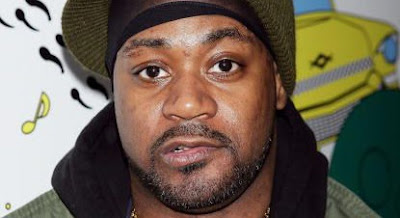 “Bow down in awe all would-be songwriters”-John Darnielle on “Shakey Dog Pt. 1″
“Bow down in awe all would-be songwriters”-John Darnielle on “Shakey Dog Pt. 1″
Though the obvious pairing would be Only Built 4 Cuban Linx 2 and Ghostdini Wizard Poetry in the Emerald City, the latest Ghostface solo album, lovingly dipped in modern R & B, a more appropriate two-course listen would consist of Ghostdini and the Mountain Goats’ The Life of the World To Come–which you’ll need to wait one more week to drop. Mountain Goats’ Darnielle and Ghostface are lyric dudes–”lyrical”, if you will–and both should be called “songwriters”. Despite one’s more tangible roots in troubadourism, they’re doing very similar things: Word-obsessive, lived-in, omni-directional detail-filled song/tales. Ghost did put the very-serious word “Poetry” in the title of his album (and then he created the most absurd cover rap’s seen in a long while, but rap’s awesomely complicated like that).
And like a “singer-songwriter”, Ghostface seems increasingly interested in new sounds, ideas, and conceits to test his writing skills. Bob Dylan going electric. Leonard Cohen working with Phil Spector. Springsteen becoming The Boss. That’s basically what Ghostdini is, Ghostface laying down some rules for his raps, and then poking and prodding and bending those self-imposed rules for the duration of the album. It’s a fractured R & B release, part of it ready for the radio and parts of it gleefully standing miles away from anything you’d hear on Hot97.
Sorta the same way Darnielle does a kind of deformed variation on oh-so-sensitive singer-songwriters. Darnielle’s work isn’t sensitive, it’s empathetic, which is tougher than just straight sensitive. He fully immerses himself in story and character–he’s like a rapper in this sense–and breaks down that folk-rock wall of brooding bard, through which everything’s filtered. “Genesis 3:23″, the third track from Life dives into the mind of a man revisiting a former home–exactly why’s left nebulous–and touches on regret and changes but never gets schticky. It never shouts out “I’m inhabiting the moment-to-moment life of a reallistically rendered person!”, it just does that shit.
Also like Darnielle’s work, the latest Ghostface is a bit samey and though the rewards aren’t super-visceral and apparent–a la Fishscale or Supreme Clientele–they’re very much there. Ghostdini is the best Ghost album since Pretty Toney. It won’t win awards and it’ll neither appeal to those yearning for a quick dose of ugly, street rap after OB4CL2 or hipster-grabbing zaniness, but therein lies much of its appeal. That Ghost is lyrically focused again, no longer trying to rap (or write) like a guy who raps/writes well and just plain doing it, brings tiny rewards that’ll stick in your crawl much longer than one of those super vicious lines on the new Raekwon or underwater-diving with Spongebob joke songs.
This new sophistication is best represented in “Stapleton Sex”, a track previewed, with an awesomely raunchy video early this month. In a sense, this preview was something of a “SPOILER” in the sense that just how out-there dirty Ghost gets on this track is magnified by the album’s otherwise relative calm and hearing this before the other songs lessened the intended thrill. At the same time, “Stapleton Sex” was a smart teaser because it’s the perfect representation of the kind of aged, life-informed–versus say, Jay-Z’s lifestyle magazine-informed–worldview on Ghostdini. That’s to say, it isn’t a radical departure or any kind of all-out rejection of before–it’s just smarter, dripping with experience.
The genius of “Stapleton Sex” is just how dirty it gets and how for Ghost, being older and more mature manifests itself in subtler ways than turning into a boring-ass square. Dude still loves to fuck and loves every weird detail (shiny dickhead, pussy juice noises, pubes on your tongue, etc.) but there’s more of a rapport between lovers on this track, than say, “Wildflower” which “Stapleton Sex” purposefully invokes. There’s a sense of engagement between Ghost and his girl, notably different than Ghost’s interruption of a female rapper, followed by his all-out rap attack on an ex in “Wildflower”, and though there’s still aggression and dirtiness to the whole thing, there’s harmony, a comfort with the aggression–the couple might have a safe word–between the two, hilariously wrapped-up in the song’s last moments of laughing together, pillow talk.
Or you get a song where Ghostface–or really, the song’s Narrator–cheerfully envisions the son or daughter he’ll soon welcome into his relationship. It’s a quick joke on expectation, as there’ve been hundreds of love songs called “Baby” but not so many about uh, the very unsexy reality of having a baby. While most rap occupies a kind of persona and casual shifting of personas, Ghost takes this to really interesting places, more or less inhabiting the minds of a series of males in or out of love. Mistake-ridden dude doing a bid (“Do Over”), jealous guy in power (“Guest House”), classic bowing loverman (“Forever”).
Children and wives–versus wifeys–casually enter Ghost’s narrators’ vocabulary.Ghostdini is smart, conceptualized maturity; not “maturity”. Ghost takes the grown-man shit conceit a step further, slyly referencing past songs and slightly flipping the stuff that makes Ghost awesome but kinda, a little played-out by the time Big Doe Rehab dropped. Ghost, like Darnielle, and unlike most rappers or songwriters, is fully developing characters and inhabiting their narrative voices.
further reading/viewing:
-A Lover’s Discourse by Roland Barthes
-Video for “Stapleton Sex”
-”This Is Not Huehueteotl Pt. IV” by John Darnielle from Last Plane to Jakarta